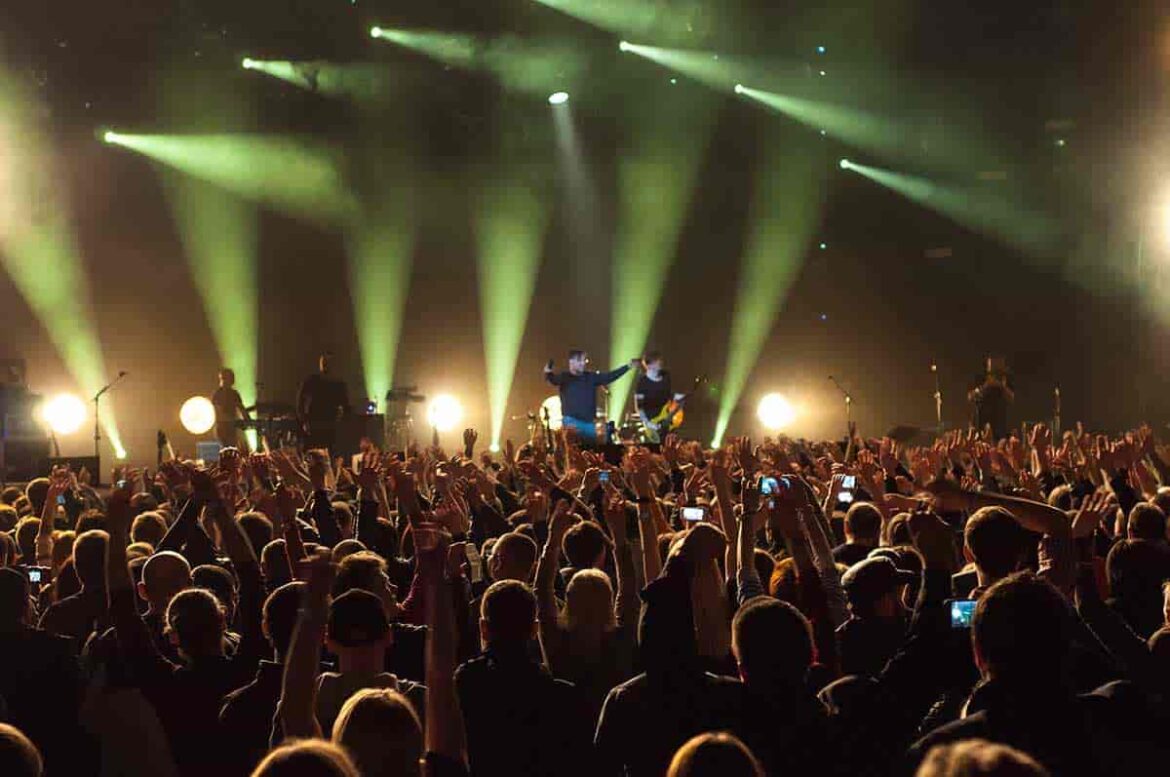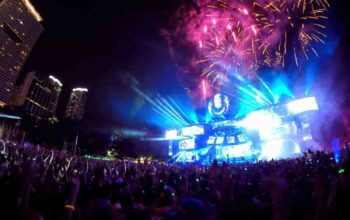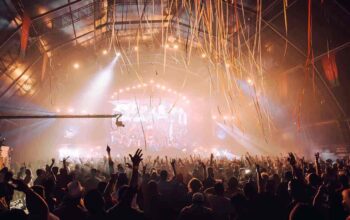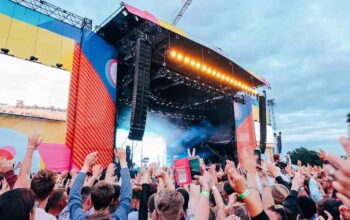The Importance of Music in a Music Festival
Last updated on April 22nd, 2022 at 06:09 am
It might not seem like much of a stretch, but the most important part of a music festival is the music itself. Each year, tens of thousands of people come together at music festivals to celebrate the types of music they love.
Music is important at music festivals because it forges an instant bond between the people who are attending the festival. The music at festivals speaks to our human desire to communicate, and music is a form of self-expression that crosses all language barriers.
Even if music festivals didn’t have all of the food, live performances, and light shows, they would still be music festivals as long as they still had music. Without this element, festivals wouldn’t draw in the massive crowds that they do. Read on to learn more about why music is the heart of music festivals and why it’s such an important feature of so many kinds.
Why Is Music Important in a Festival?
Humans have been playing music at large social gatherings for thousands of years, and it’s no wonder why. Music has been a crucial part of human history almost as long as humans have. Every human culture on the planet has music, and music is considered the universal language. (Source: Psychology Today)
Here are a few more reasons music is important in a music festival (Source: ED Times):
- Music has the power to transform mood: If you’ve ever seen musicians hold sway over a crowd of thousands or cause hundreds of fans to burst into tears at once, you’ll recognize this power. The empathic qualities of music allow it to act as a shortcut to the human heart, and musicians take advantage of this to bring people together positively.
- Music can become associated with memory: Like strong smells, certain lyrics or musical experiences can become embedded in your soul and become a part of who you are. This allows people to conjure up the good vibes of the music festival just by playing the music again later.
- Music can be emotionally healing: In many cultures music is seen as a healing force that can help ease depression, anxiety, and other negative emotions in people. (Source: Cleveland Clinic) Music can help put people more in touch with their repressed feelings, buried trauma, and collective consciousness.
- Music allows people to express themselves with movement: Music and dances are two sides of the same coin, and many music festivals put an emphasis on both artistic mediums. One of the best things about a music festival is the ability to dance with thousands of other people and just lose yourself in the music.
- Music is personal: The field of music is so huge and everyone’s tastes are so individual that it can be difficult to find common ground with other people based on musical tastes. Music festivals are one place where people can meet up with strangers and know without even asking them that their musical tastes are a good match.
No matter which way you cut it, a music festival just isn’t the same without the music. In fact, the whole basic point of a music festival is to bring together a large gathering to experience the same live music together in real-time.
This is a much different vibe and experience than listening to records in your bedroom or even going to see a band at a party.
The current of emotion running through a crowd at a music festival is so strong it almost feels like real electricity. Ever heard someone describe getting chills or crying at a concert? That’s the power of live music at play. The size of the ground amplifies that strong rush of emotion.
Festivals Without Music and Why They Suck
If you want to look at it from another angle, try looking at some of the festivals around that don’t have any music in them. Here are just a couple of festival types that don’t have music included as part of the festivities:
- Job fairs: Without music to liven the mood and lighten things up, job fairs are often a grim and desperate affair. Keeping the mood neutral at a job fair is important for the business reps to be able to see a good representation of how people might act on the job, but it makes job fairs a boring place to be.
- Book fairs: Don’t get us wrong, we love a good book as much as the next person. But the lack of thrilling music at the book fair doesn’t do those books any favors, and each person at the book fair is basically left in their own little world to browse.
- Film festivals: Sure, film festivals might have some good movies, but they don’t have the feeling of connected group excitement that gets generated by the music that brings people together at a music festival.
Okay, so music-less festivals may not suck completely. All of these festivals have their advantages. But give us a festival without live music, and we’ll just suggest you add some!
Different Types of Music Festivals
When many people think of music festivals, they think of huge EDM fairs like Daisy Electric Carnival and Burning Man. However, these are only one type of music festival out of many. Here are some of the main types of music festivals you’re likely to come across:
- EDM music festivals and raves: EDM music festivals put as much emphasis on light shows, dance, and DJ performances as they do on electronica music itself. This music can get crowds of thousands moving in sync with one another. EDM music festivals are usually large, while smaller EDM raves may pop up here and there.
- Fiddler and bluegrass conventions: This is a pretty different take on the music festival. Usually occurring in Southeastern or Midwestern towns, fiddler conventions have a focus on folk and bluegrass music. Many fiddler conventions encourage visitors to bring their own instruments for jam sessions between live performances.
- Renaissance fairs: While Renaissance fairs host a large range of medieval-themed activities along with live music, bands usually feature heavily in the festivities. Renaissance fairs are one of the few music festivals where you can see the use of older, rarer instruments such as lyres, bagpipes, and mandolins.
- Choral and classical music festivals: Unlike many other music festivals, which focus only on gathering and appreciating the music, a lot of choral and classical music festivals are considered competitions too. Choirs and symphony orchestras from across the country attend special music festivals to battle each other for regional and national titles.
These are only a handful of the different types of music festivals out there. Whether you like metal or country or something in-between, chances are somewhere in North America there are at least half a dozen music festivals for you to attend where you can be around thousands of other people who love the exact same kind of music you do.
Playing Music at a Music Festival
For garage bands and Grand Ole Opry hopefuls, playing music either by yourself or with others at a music festival may end up being one of your first exposures to performing at a live musical performance on your own. Picking up gigs at smaller or local music festivals is a great way for novice musicians to get their foot in the door performing live music.
Even if you don’t play in a band, there are many ways that amateur musicians can use music festivals as a stage for performance. For example, setting up your own DJ booth at a local rave or joining in at a fiddlers’ jam session can bring you exposure that you wouldn’t have otherwise. If you develop a following, you might even find yourself performing music at festivals for pay.
If you’re thinking about making the jump from attending music festivals to playing in them, keep the following in mind (Source: Music Industry How-To):
- Interact with the fans: One of the most important parts of the music festival experience is the interaction between the musicians and the fans. If you want to get more people interested in your music, taking the time to interact with the audience both during and after the show can help keep people interested in your music.
- Be prepared: If you do well at a jam session and someone approaches you with a musical job opportunity, you better have business cards and a demo tape ready to go. It’s also a good idea to think ahead about how you might react to being scouted as musical talent if you’re planning to perform live all the time.
- Be professional: If you’re lucky enough to get signed on to a music festival with your band or musical act, go all out to show how much of a professional you can be. Show up a few minutes early so that you’re prepared to perform and be polite with everyone involved. You never know who you might run into.
Music festivals are great for fans, but they’re also a vital way for emerging musicians to develop connections within the business and build their reputation over time. If your love of live music is something you’re interested in making a career, festivals are a good place to network with the music community.
Tips for Attending a Music Festival
So you’ve decided to visit a music festival, either as a fan or maybe as a performer. If it’s your first time attending, the crowds and the emotions of the crowd can be overwhelming. Here are some tips for making your first music festival experience more fun and comfortable:
- Bring basic necessities: You’ll need water, sunscreen, and snacks to keep from getting hungry, thirsty, and sunburnt at outdoor music festivals. If you’re planning on camping over a long weekend festival, you’ll need other camping supplies too.
- Bring your own hygiene products: Trust us, you’ll appreciate those wet wipes and toilet paper later on.
- Set up a meeting point: If you’re going to a music festival with others, it’s easy to get accidentally separated in the crowds. If you do get separated, make sure that everyone agrees on a single place to meet back up.
- Bring charging cords and spare solar batteries: For the sake of keeping all of your friends in the loop and a way to call for help in an emergency, make sure that your phone doesn’t die while you’re at the music festival.
- Bring a schedule: Knowing which musical acts you want to see most and when they’ll be performing can help you make sure that you don’t end up stuck in the back of the crowd. You may also have to do some compromising with the group if different people want to see different acts that perform at the same time. (Source: Spoon University)
Music festivals are fun, but they’re a lot more fun when you’re prepared ahead of time. Don’t waste prime festival time when you should be appreciating the music scrambling around trying to get organized.
Music Festivals Are Built Around the Music
Unlike other festivals which feature music as an accessory rather than the main event, music festivals need music.
Without music to forge an emotional connection between thousands of people at once, music festivals wouldn’t have the tempting charm that they do for so many people every summer. Check out a music festival this festival season and you’ll see what we mean!




